高三英语语法连词课件(共21张PPT)
文档属性
| 名称 | 高三英语语法连词课件(共21张PPT) |
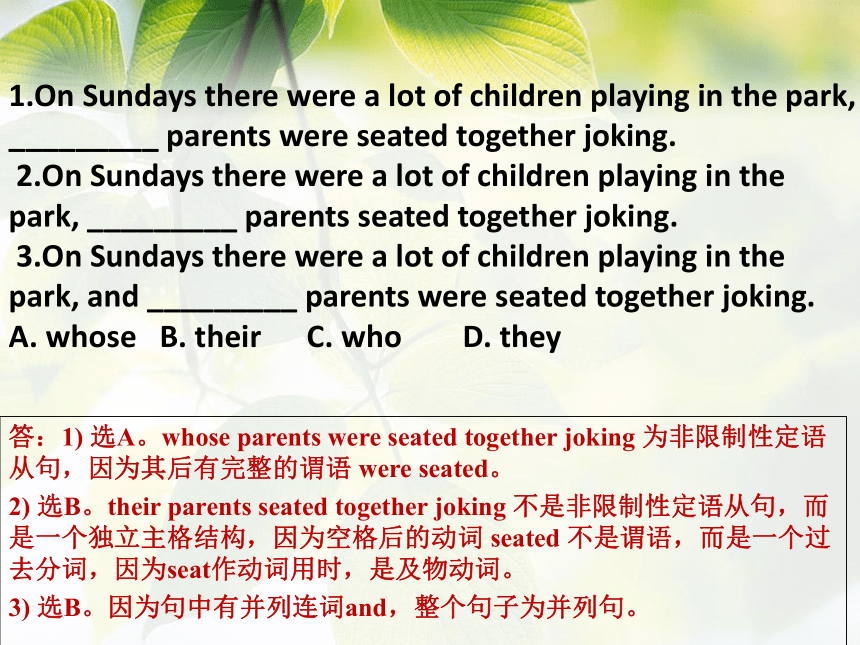
|
|
| 格式 | zip | ||
| 文件大小 | 464.4KB | ||
| 资源类型 | 教案 | ||
| 版本资源 | 通用版 | ||
| 科目 | 英语 | ||
| 更新时间 | 2018-12-02 00:00:00 | ||
图片预览

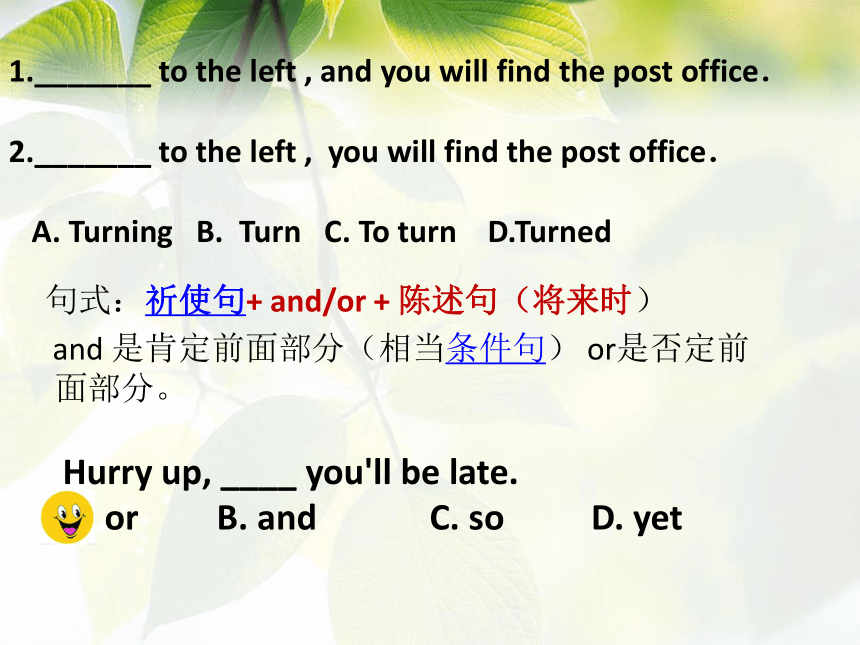
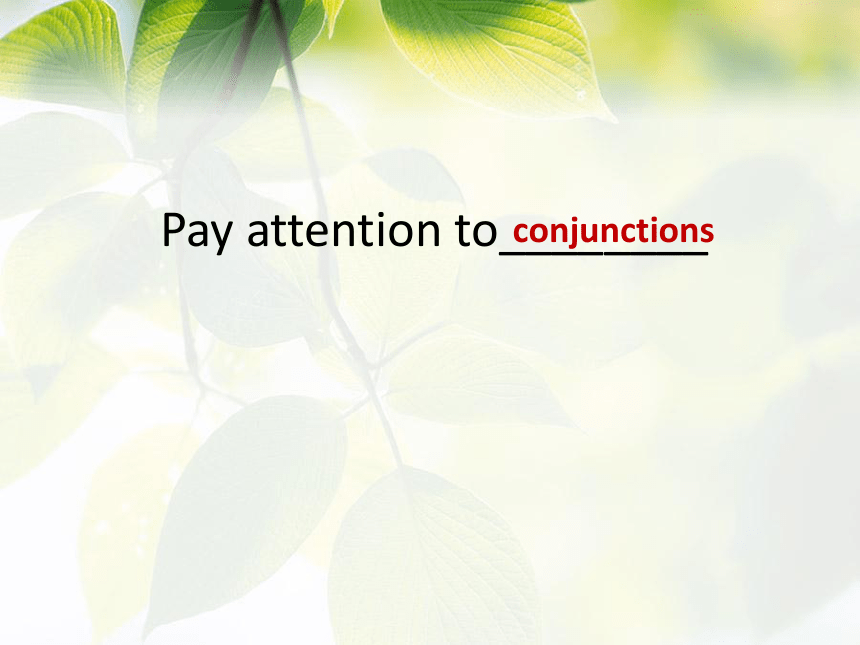
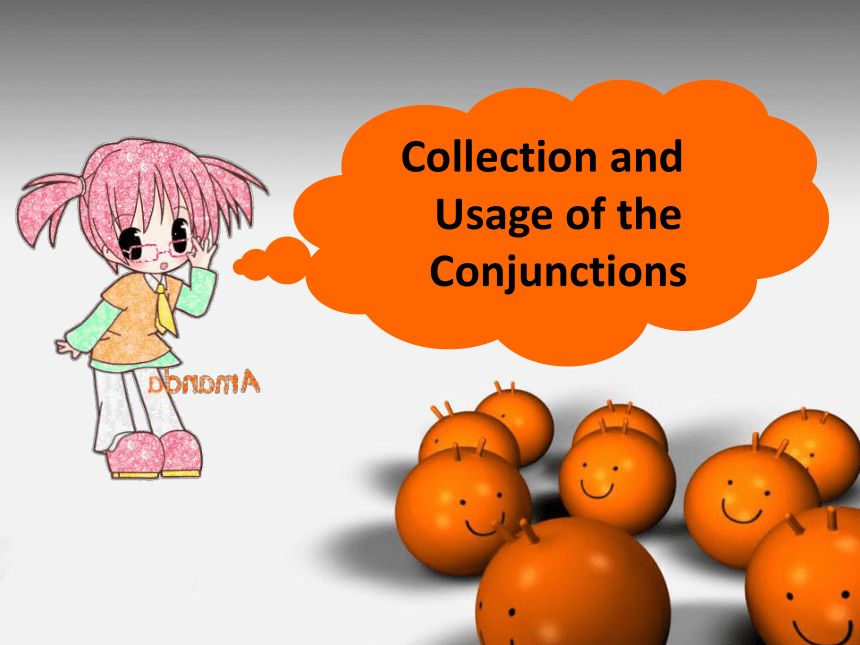

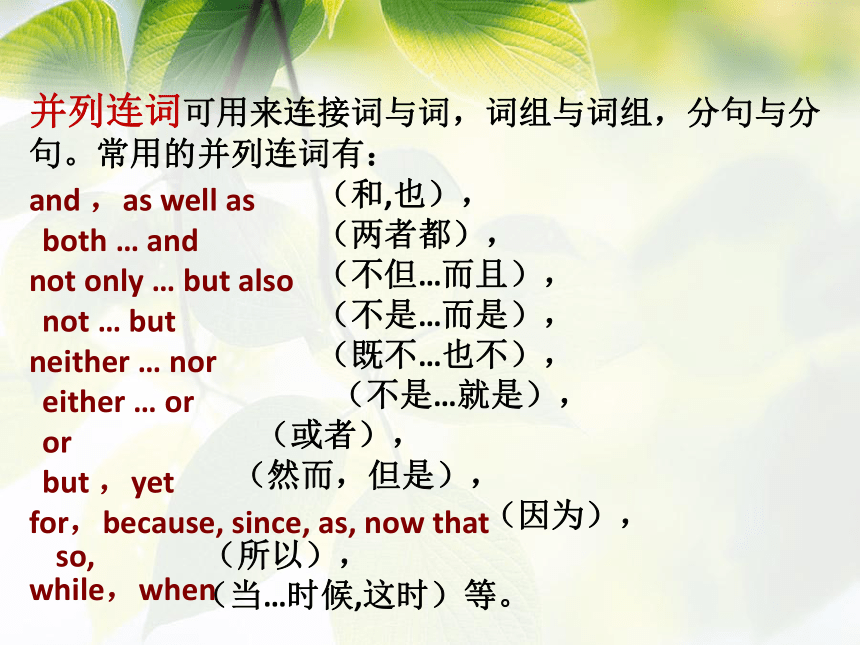
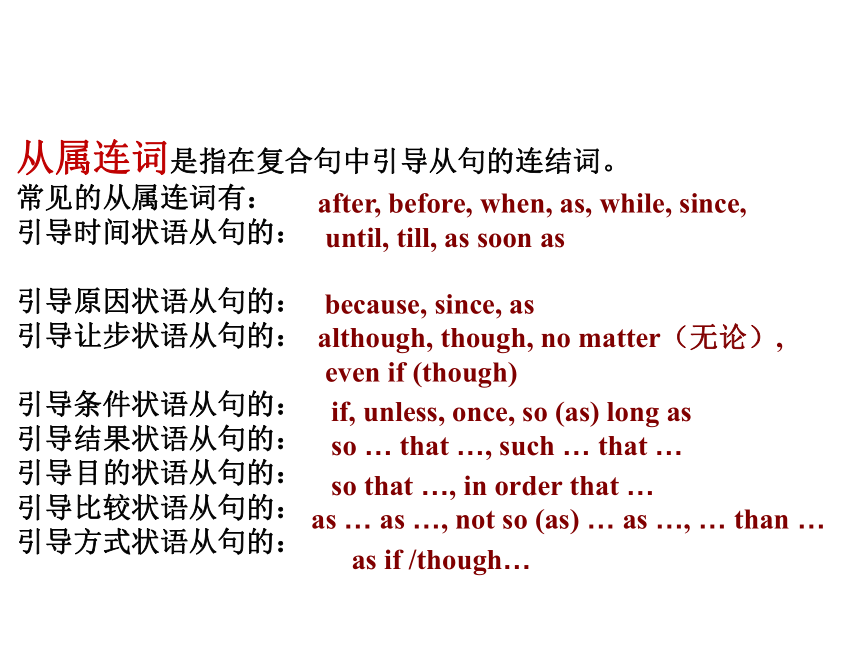
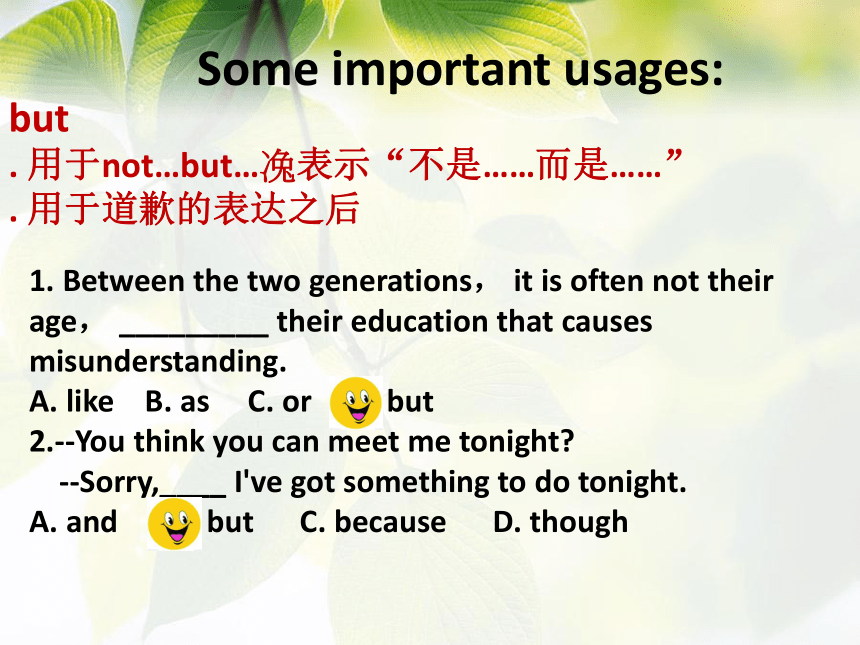
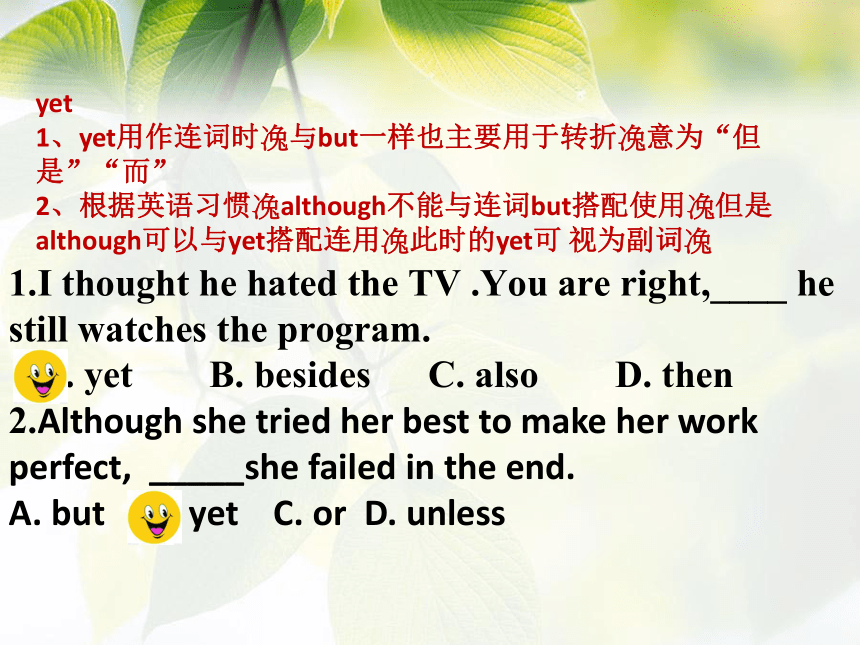
文档简介
课件21张PPT。1.On Sundays there were a lot of children playing in the park, _________ parents were seated together joking.
2.On Sundays there were a lot of children playing in the park, _________ parents seated together joking.
3.On Sundays there were a lot of children playing in the park, and _________ parents were seated together joking.
A. whose B. their C. who D. they
答:1) 选A。whose parents were seated together joking 为非限制性定语从句,因为其后有完整的谓语 were seated。
2) 选B。their parents seated together joking 不是非限制性定语从句,而是一个独立主格结构,因为空格后的动词 seated 不是谓语,而是一个过去分词,因为seat作动词用时,是及物动词。
3) 选B。因为句中有并列连词and,整个句子为并列句。
1._______ to the left , and you will find the post office. 2._______ to the left , you will find the post office. A. Turning B. Turn C. To turn D.Turned 句式:祈使句+ and/or + 陈述句(将来时)
and 是肯定前面部分(相当条件句) or是否定前面部分。Hurry up, ____ you'll be late. A. or B. and C. so D. yetPay attention to________conjunctionsCollection and Usage of the Conjunctions
连词是一种虚词, 它不能独立担任句子成分。用来连接词,短语,从句与句子。 连词主要可分为两类:
并列连词
从属连词并列连词可用来连接词与词,词组与词组,分句与分句。常用的并列连词有:
(和,也),
(两者都),
(不但…而且),
(不是…而是),
(既不…也不),
(不是…就是),
(或者),
(然而,但是),
(因为),
(所以),
(当…时候,这时)等。and ,as well asboth … and not only … but also not … but neither … noreither … or orbut ,yetfor,because, since, as, now thatso, while,when从属连词是指在复合句中引导从句的连结词。
常见的从属连词有:
引导时间状语从句的:
引导原因状语从句的:
引导让步状语从句的:
引导条件状语从句的:
引导结果状语从句的:
引导目的状语从句的:
引导比较状语从句的:
引导方式状语从句的: after, before, when, as, while, since,
until, till, as soon as
because, since, asalthough, though, no matter(无论),
even if (though)if, unless, once, so (as) long asso … that …, such … that …so that …, in order that …as … as …, not so (as) … as …, … than …as if /though…but .?用于not…but…?表示“不是……而是……”? .?用于道歉的表达之后?1. Between the two generations, it is often not their age, _________ their education that causes misunderstanding. A. like B. as C. or D. but
2.--You think you can meet me tonight? --Sorry,____ I've got something to do tonight.
A. and B. but C. because D. though
Some important usages:yet
1、yet用作连词时?与but一样也主要用于转折?意为“但是”“而”?
2、根据英语习惯?although不能与连词but搭配使用?但是although可以与yet搭配连用?此时的yet可?视为副词??1.I thought he hated the TV .You are right,____ he still watches the program. A. yet B. besides C. also D. then
2.Although she tried her best to make her work perfect, _____she failed in the end. A. but B. yet C. or D. unless
while? 1、表示让步的用法?其意为“尽管”“虽然”. 2、表示对比的用法?其意为“而”“但”.
1. _________ the Internet is of great help, I don’t think it’s a good idea to spend too much time on it.
A. If B. While C. Because D. As
2. In some places women are expected to earn money _________ men work at home and raise their children.
A. but B. while C. because D. though
1.I had just stepped out of the bathroom and was busily drying myself with a towel______ I heard voices.? A.as?B.when??C.after???D.While
2. How can you expect to learn anything ____ you never listen?
A. In case B. even if C. unless D. when
1.“这时;突然’’大致有以下情况: be about to do … when be doing … when be on the point of doing … when had done … when sb had hardly / scarcely /barely … when 2. 表示条件,相当于 if ,since, considering that ,引导条件状语从句。 【1】It is difficult for us to learn a new lesson in life ___ we’ve actually had that lesson. (07天津卷,8) A. until B. after C. since D. when 【2】It ___ we had stayed together for a couple of weeks ____ I found we had a lot in common.(07浙江卷,10) A. was until; when B. was until; that C. wasn’t until; when D. wasn’t until; that untill 1.“终止性动词/延续性动词的否定式+until”表示“直到......才......” 2.用于强调句型“It is not until......that......” 1.(2005广东)The America Civil War lasted four years ______ the North won in the end. A. after B. before C. when D. then *用于肯定句中强调主句所表达的时间,距离长,或花费的精力大,译成“才”连词对于阅读理解中猜测词、句的提示作用1.The woman’s feet hurt,so she went to a podiatrist.
podiatrist(足病医生) 2. The major points of your plan are clear to me,but the details are still hazy.
hazy “模糊”或“迷惑”的意思 ?? 1.Although the early morning had been very cool, the noonday sun was very tropical. 2.He had been getting better but during the night his condition deteriorated. 3. He is one of the most loquacious men I know. His brother, however, does not like to talk much.(2004年,福建卷,C 篇) “She is ashamed and embarrassed but doesn’t really have any explanation why she did this.”Miss Duff said. She doesn’t intend to steal when she went into the store. She is at a loss to explain it. She is otherwise a very respectable and intelligent young lady. She went to her doctor and ask for advice because she wants to know if there is anything in particular that caused her to do his. 64.What does the underlined sentence “She is at a loss to explain it” mean? A. In her opinion, it was a loss to the clothes shops where she stole things. B. She doesn’t have any idea why she has the desire to steal from shops. C. She thinks it is a loss for her to explain why she stole things from shops. D. Personally she feels ashamed and embarrassed for her shoplifting actions.Dear Mr. Zhang,
We have held a discussion about whether it is good or not for a top student to share a desk with a slower student.
Some are for the idea. As they know, everyone has strengths as well as weaknesses. They are not good at lessons, they might do well in other fields like sports or arts. They can learn from each other, and they may develop a friendship. Top students can help slower ones gain self-confidence by helping them with their lessons, which benefits them all.
Others don’t hold the same view. They think some slower students are always making trouble, keeping talking in class, breaking school rules, which may lead to them forming the bad habits. Slower students often ask top students questions, which has a bad effect on their studies.
I’d like to choose to share a desk with a slower student so that we can learn from each other and make progress together. Dear Mr. Zhang,
We have held a discussion about whether it is good or not for a top student to share a desk with a slower student.
Some are for the idea. As they know, everyone has strengths as well as weaknesses. they are not good at lessons, they might do well in other fields like sports or arts. , they can learn from each other, and they may develop a friendship. , top students can help slower ones gain self-confidence by helping them with their lessons, which benefits them all.
, others don’t hold the same view. They think some slower students are always making trouble, keeping talking in class, breaking school rules, which may lead to them forming the bad habits. , slower students often ask top students questions, which has a bad effect on their studies.
, I’d like to choose to share a desk with a slower student so that we can learn from each other and make progress together. Connectivesthough, although, even if/though; Besides, in addition, what’s more, moreover, furthermore; however, on the contrary, on the other hand; such as, like, namely;In my opinion, from my point of view, as far as I am concernedDear Mr. Zhang,
We have held a discussion about whether it is good or not for a top student to share a desk with a slower student.
Some are for the idea. As they know, everyone has strengths as well as weaknesses. Although they are not good at lessons, they might do well in other fields like sports or arts. Therefore, they can learn from each other, and they may develop a friendship. In addition, top students can help slower ones gain self-confidence by helping them with their lessons, which benefits them all.
However, others don’t hold the same view. They think some slower students are always making trouble, such as keeping talking in class, breaking school rules, which may lead to them forming the bad habits. Besides, slower students often ask top students questions, which has a bad effect on their studies.
In my opinion, I’d like to choose to share a desk with a slower student so that we can learn from each other and make progress together. Conjunction/connective is like lubricating oil(润滑油), which makes our language more fluent, vivid and beautiful.1.并列用语:
as well as, not only…but (also), including
2.对比用语:
on one hand ,on the other hand, on the contrary/contrary to ..., though, for one thing ;for another, nevertheless
3. 递进用语:
even, besides, what’s more, as for, so…that…, worse still, moreover, furthermore; but for, in addition, to make matters worse
4. 例证用语:
that is to say, for example, for instance, as a matter of fact, in fact, namely
5. 时序用语:
first/firstly, meanwhile, before long, ever since, while, at the same time, in the meantime, shortly after, nowadays,
6. 强调用语:
especially, indeed, at least, at the most, What in the world/on earth.. , not at all ,
7. 因果用语:
thanks to, because, as a result, because of/as a result of , without, with the help of..., owe ...to...
8. 总结用语:
in short; briefly/ in brief ; generally speaking, in a word, as you know, as is known to all
9.表达自己的观点:in my opinion, personally, as far as I know, I believe, I think, as we all know ,It is known to us all that….
2) 选B。their parents seated together joking 不是非限制性定语从句,而是一个独立主格结构,因为空格后的动词 seated 不是谓语,而是一个过去分词,因为seat作动词用时,是及物动词。
3) 选B。因为句中有并列连词and,整个句子为并列句。
1._______ to the left , and you will find the post office. 2._______ to the left , you will find the post office. A. Turning B. Turn C. To turn D.Turned 句式:祈使句+ and/or + 陈述句(将来时)
and 是肯定前面部分(相当条件句) or是否定前面部分。Hurry up, ____ you'll be late. A. or B. and C. so D. yetPay attention to________conjunctionsCollection and Usage of the Conjunctions
连词是一种虚词, 它不能独立担任句子成分。用来连接词,短语,从句与句子。 连词主要可分为两类:
并列连词
从属连词并列连词可用来连接词与词,词组与词组,分句与分句。常用的并列连词有:
(和,也),
(两者都),
(不但…而且),
(不是…而是),
(既不…也不),
(不是…就是),
(或者),
(然而,但是),
(因为),
(所以),
(当…时候,这时)等。and ,as well asboth … and not only … but also not … but neither … noreither … or orbut ,yetfor,because, since, as, now thatso, while,when从属连词是指在复合句中引导从句的连结词。
常见的从属连词有:
引导时间状语从句的:
引导原因状语从句的:
引导让步状语从句的:
引导条件状语从句的:
引导结果状语从句的:
引导目的状语从句的:
引导比较状语从句的:
引导方式状语从句的: after, before, when, as, while, since,
until, till, as soon as
because, since, asalthough, though, no matter(无论),
even if (though)if, unless, once, so (as) long asso … that …, such … that …so that …, in order that …as … as …, not so (as) … as …, … than …as if /though…but .?用于not…but…?表示“不是……而是……”? .?用于道歉的表达之后?1. Between the two generations, it is often not their age, _________ their education that causes misunderstanding. A. like B. as C. or D. but
2.--You think you can meet me tonight? --Sorry,____ I've got something to do tonight.
A. and B. but C. because D. though
Some important usages:yet
1、yet用作连词时?与but一样也主要用于转折?意为“但是”“而”?
2、根据英语习惯?although不能与连词but搭配使用?但是although可以与yet搭配连用?此时的yet可?视为副词??1.I thought he hated the TV .You are right,____ he still watches the program. A. yet B. besides C. also D. then
2.Although she tried her best to make her work perfect, _____she failed in the end. A. but B. yet C. or D. unless
while? 1、表示让步的用法?其意为“尽管”“虽然”. 2、表示对比的用法?其意为“而”“但”.
1. _________ the Internet is of great help, I don’t think it’s a good idea to spend too much time on it.
A. If B. While C. Because D. As
2. In some places women are expected to earn money _________ men work at home and raise their children.
A. but B. while C. because D. though
1.I had just stepped out of the bathroom and was busily drying myself with a towel______ I heard voices.? A.as?B.when??C.after???D.While
2. How can you expect to learn anything ____ you never listen?
A. In case B. even if C. unless D. when
1.“这时;突然’’大致有以下情况: be about to do … when be doing … when be on the point of doing … when had done … when sb had hardly / scarcely /barely … when 2. 表示条件,相当于 if ,since, considering that ,引导条件状语从句。 【1】It is difficult for us to learn a new lesson in life ___ we’ve actually had that lesson. (07天津卷,8) A. until B. after C. since D. when 【2】It ___ we had stayed together for a couple of weeks ____ I found we had a lot in common.(07浙江卷,10) A. was until; when B. was until; that C. wasn’t until; when D. wasn’t until; that untill 1.“终止性动词/延续性动词的否定式+until”表示“直到......才......” 2.用于强调句型“It is not until......that......” 1.(2005广东)The America Civil War lasted four years ______ the North won in the end. A. after B. before C. when D. then *用于肯定句中强调主句所表达的时间,距离长,或花费的精力大,译成“才”连词对于阅读理解中猜测词、句的提示作用1.The woman’s feet hurt,so she went to a podiatrist.
podiatrist(足病医生) 2. The major points of your plan are clear to me,but the details are still hazy.
hazy “模糊”或“迷惑”的意思 ?? 1.Although the early morning had been very cool, the noonday sun was very tropical. 2.He had been getting better but during the night his condition deteriorated. 3. He is one of the most loquacious men I know. His brother, however, does not like to talk much.(2004年,福建卷,C 篇) “She is ashamed and embarrassed but doesn’t really have any explanation why she did this.”Miss Duff said. She doesn’t intend to steal when she went into the store. She is at a loss to explain it. She is otherwise a very respectable and intelligent young lady. She went to her doctor and ask for advice because she wants to know if there is anything in particular that caused her to do his. 64.What does the underlined sentence “She is at a loss to explain it” mean? A. In her opinion, it was a loss to the clothes shops where she stole things. B. She doesn’t have any idea why she has the desire to steal from shops. C. She thinks it is a loss for her to explain why she stole things from shops. D. Personally she feels ashamed and embarrassed for her shoplifting actions.Dear Mr. Zhang,
We have held a discussion about whether it is good or not for a top student to share a desk with a slower student.
Some are for the idea. As they know, everyone has strengths as well as weaknesses. They are not good at lessons, they might do well in other fields like sports or arts. They can learn from each other, and they may develop a friendship. Top students can help slower ones gain self-confidence by helping them with their lessons, which benefits them all.
Others don’t hold the same view. They think some slower students are always making trouble, keeping talking in class, breaking school rules, which may lead to them forming the bad habits. Slower students often ask top students questions, which has a bad effect on their studies.
I’d like to choose to share a desk with a slower student so that we can learn from each other and make progress together. Dear Mr. Zhang,
We have held a discussion about whether it is good or not for a top student to share a desk with a slower student.
Some are for the idea. As they know, everyone has strengths as well as weaknesses. they are not good at lessons, they might do well in other fields like sports or arts. , they can learn from each other, and they may develop a friendship. , top students can help slower ones gain self-confidence by helping them with their lessons, which benefits them all.
, others don’t hold the same view. They think some slower students are always making trouble, keeping talking in class, breaking school rules, which may lead to them forming the bad habits. , slower students often ask top students questions, which has a bad effect on their studies.
, I’d like to choose to share a desk with a slower student so that we can learn from each other and make progress together. Connectivesthough, although, even if/though; Besides, in addition, what’s more, moreover, furthermore; however, on the contrary, on the other hand; such as, like, namely;In my opinion, from my point of view, as far as I am concernedDear Mr. Zhang,
We have held a discussion about whether it is good or not for a top student to share a desk with a slower student.
Some are for the idea. As they know, everyone has strengths as well as weaknesses. Although they are not good at lessons, they might do well in other fields like sports or arts. Therefore, they can learn from each other, and they may develop a friendship. In addition, top students can help slower ones gain self-confidence by helping them with their lessons, which benefits them all.
However, others don’t hold the same view. They think some slower students are always making trouble, such as keeping talking in class, breaking school rules, which may lead to them forming the bad habits. Besides, slower students often ask top students questions, which has a bad effect on their studies.
In my opinion, I’d like to choose to share a desk with a slower student so that we can learn from each other and make progress together. Conjunction/connective is like lubricating oil(润滑油), which makes our language more fluent, vivid and beautiful.1.并列用语:
as well as, not only…but (also), including
2.对比用语:
on one hand ,on the other hand, on the contrary/contrary to ..., though, for one thing ;for another, nevertheless
3. 递进用语:
even, besides, what’s more, as for, so…that…, worse still, moreover, furthermore; but for, in addition, to make matters worse
4. 例证用语:
that is to say, for example, for instance, as a matter of fact, in fact, namely
5. 时序用语:
first/firstly, meanwhile, before long, ever since, while, at the same time, in the meantime, shortly after, nowadays,
6. 强调用语:
especially, indeed, at least, at the most, What in the world/on earth.. , not at all ,
7. 因果用语:
thanks to, because, as a result, because of/as a result of , without, with the help of..., owe ...to...
8. 总结用语:
in short; briefly/ in brief ; generally speaking, in a word, as you know, as is known to all
9.表达自己的观点:in my opinion, personally, as far as I know, I believe, I think, as we all know ,It is known to us all that….
